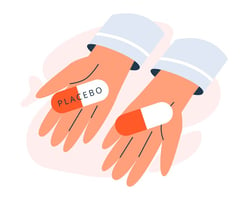Antidepressant Drugs and the Placebo Effect Make Headlines
The effects of antidepressant medications are all in people's heads.
That’s what a Harvard psychologist told Lesley Stahl on “60 Minutes” last Sunday.
Irving Kirsch, Ph.D., said that antidepressant drugs are no better than placebo pills for people with mild to moderate depression. He agreed that people with severe cases show a much stronger response.
Kirsch’s studies of the placebo effect lead him to argue that taking the drugs may work, but that "the reason [people] get better is not because of the chemicals in the drug.” Simply the act of taking a pill or the added attention from clinicians may make patients feel better, he said.
Psychiatrists and Food and Drug Administration scientists interviewed on the program disagreed with Kirsch’s views. “It is unfortunate that ‘60 Minutes’ has provided its viewers with highly misleading information, and I encourage everyone taking antidepressants to talk with your doctor before making any changes,” said APA President John Oldham, M.D., in a statement.
APA’s treatment guidelines on depression recommend psychotherapy first for mild to moderate depression, and only if this intervention falls short should the physician decide whether antidepressants are needed.
For a discussion in Psychiatric News about the complexities of the placebo effect, click here. And for an in-depth review of medications in depression treatment, see The Evidence-Based Guide to Antidepressant Medications from American Psychiatric Publishing.
Kirsch’s studies of the placebo effect lead him to argue that taking the drugs may work, but that "the reason [people] get better is not because of the chemicals in the drug.” Simply the act of taking a pill or the added attention from clinicians may make patients feel better, he said.
Psychiatrists and Food and Drug Administration scientists interviewed on the program disagreed with Kirsch’s views. “It is unfortunate that ‘60 Minutes’ has provided its viewers with highly misleading information, and I encourage everyone taking antidepressants to talk with your doctor before making any changes,” said APA President John Oldham, M.D., in a statement.
APA’s treatment guidelines on depression recommend psychotherapy first for mild to moderate depression, and only if this intervention falls short should the physician decide whether antidepressants are needed.
For a discussion in Psychiatric News about the complexities of the placebo effect, click here. And for an in-depth review of medications in depression treatment, see The Evidence-Based Guide to Antidepressant Medications from American Psychiatric Publishing.
(Image: Julie Ten Eyck [JTeffects]/Shutterstock.com)






